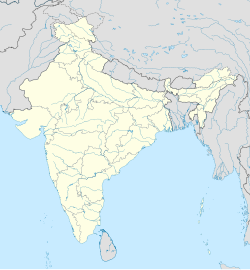Byse is a village in the Shimoga district of Karnataka, India. It is located around 140 km from Mangalore, in the Nagara hobli of the Hosanagara taluka.[2]
Byse | |
|---|---|
village | |
| Coordinates: 13°49′45″N 75°00′43″E / 13.82917°N 75.01194°E | |
| Country | India |
| State | Karnataka |
| District | Shimoga |
| Taluka | Hosanagara |
| Population | |
• Total | 1,019 |
| Time zone | UTC+5:30 (IST) |
| Postal Index Number | 577418 |
| Census 2011 code | 608026[1] |
| ISO 3166 code | IN-KA |
| Vehicle registration | KA |
History
editMegalithic structures have been found at Byse at a site called Nilaskal Byana ("the field with the standing stones"). The villagers have long been aware of the presence of these megaliths, and a 1975 thesis by A. Sundara mentions the site as containing menhirs arranged in no particular order.[3]
In 2007, Professor Srikumar M Menon from the Manipal School of Architecture and Planning, Manipal University noticed the stones during a trip to the Nagara Fort at Byse. Subsequently, the researchers from the Tata Institute of Fundamental Research (TIFR) and Manipal University surveyed 26 stones during 2007-10. The researchers speculated that the stones could be dated prior to 1000 BCE, though carbon dating is yet to be done, as of March 2012.[4] Using computer simulation, the researchers concluded that at least one of the stone alignments at Byse has "strong astronomical associations", which indicates that the site could have been an ancient astronomical observatory.[5]
The tallest menhir is 3.6 m in height, 1.6 m in width and 25 cm in thickness. Two menheirs are used by the villagers for a form of ancestor worship.[5]
Geography
editThe Kusannanakere water tank is located in Byse.[6]
Administration
editThe habitations that fall under the Byse gram panchayat include:[7]
- Baise
- Konanahalli
- Kardigere
- Kuppaduru
- Kannamane
- Hokoppalau
- Chikalli
- Dhummadhagadde
- Doddagundi
- Niraballi
- Gundigadde
- Athikodige
- Sulagodu
- Channakodige
Culture
editThis section needs expansion. You can help by adding to it. (June 2012) |
The Chidambareshwara Devaru and Nethrabylu Choudi Devasthana Hindu shrines are located in Byse.[8]
References
edit- ^ "Reports of National Panchayat Directory". Ministry of Panchayati Raj, Government of India. Archived from the original on 12 July 2012. Retrieved 15 March 2012.
- ^ "Bhoo Chethana". Karnataka State Department of Agriculture. Retrieved 15 March 2012.
- ^ A. Sundara (1975). The early chamber tombs of South India: a study of the iron age megalithic monuments of north Karnataka. Delhi: University Publishers. OCLC 2512820. Retrieved 15 March 2012.
- ^ Snehal Rebello (15 March 2012). "Megalithic structures a chance discovery". Hindustan Times. Archived from the original on 17 March 2012. Retrieved 15 March 2012.
- ^ a b Srikumar M. Menon, Mayank N. Vahia and Kailash Rao. "Stone Alignment with Solar and Other Sightlines in South India" (PDF). Tata Institute of Fundamental Research. Retrieved 15 March 2012.
- ^ "Rejuvination of Kusannanakere at Byse Village". Rural Development & Panchayat Raj Department, Government of Karnataka. Retrieved 15 March 2012.
- ^ "Census Data Updation Status: Hosanagar Block". Pradhan Mantri Gram Sadak Yojana. Government of India. Retrieved 15 March 2012.
- ^ "List of temples in the Shimoga District". Hindu Religious Institutions & Charitable Endowments Department, Government of Karnataka. Archived from the original on 30 January 2012. Retrieved 15 March 2012.

